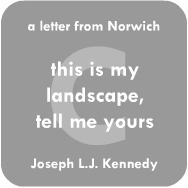

Seventeen years ago, I was five years old and lived in Seaham Harbour, a mining town in northeast England. There was a miner's strike, a sort of final flourish of the British socialism that had all but disappeared by then. Energy was rationed and eager young mothers like mine rose at five in the morning to queue for the bread that could only be baked once a day.
To use the term nuclear family to describe my mother, father, and I would be sick, with nuclear energy standing proud as Mrs. Thatcher's trump card. But there we were, the three of us: two young, fervent professionals and their black-haired, pale-skinned, bespectacled lump of a child; none of us on the picket lines, but all of us hearing the thunder of the UDM (Union of Democratic Mineworkers)-stacked coal lorries sneaked out of the colliery half a mile away under darkness; all of us listening to the bitter rant of the miners; all of us clearing our plates, as afraid of waste as the rest of our street.
To this day, despite (or perhaps, because of) the increasing centrism of the party now in power, the constituency of Easington still elects a Labour member with over 80% of its vote (the old adage holds true: put a red rosette on a donkey and it would be elected). Yet my memories are of glove puppets left on the bus, returned by the driver who knew my grandfather; of the high-windowed Victorian schoolhouse; of my Masters of the Universe action toys; and of leaving Seaham Harbour to move to a genteel village spitting distance from Cambridge.
This summer, I'm set to move again, from 'leafy' Norwich to 'gritty' Sheffield. For me, their large, left-leaning, and well-respected universities connect the two. Much more separates them.
Norfolk Magazine calls my neighbourhood 'the Notting Hill of Norfolk'. I'm not a fan of the real Notting Hill (and would sooner break bread with Dick Cheney than ever have to sit through the movie), which has managed to make the leap from slum to fully-fledged yuppietopia without the usual boho decade. I honestly think Norwich's Golden Triangle deserves much better; an equation with Edinburgh's West End or Chicago's Hyde Park wouldn't go amiss. Conversely, perhaps it would.
For as much as the prevailing sense of community in the Victorian terraces between central Norwich and the University is so palpably more liberated than any other monocultural neighbourhood on earth, and as much as it has been the place where a shy suburban kid became a shy urban adult, Norwich is failing to inspire me to stay because it seems to be only that: a place for people to grow up. It's a city in a bubble, all wrapped up in its quaint self-promotion, urbanism-lite, and history-lite. Some of the worst deprivation in Europe is hidden in this region; not only behind the 'Fine City' tag on the Welcome to Norwich signs, but also behind the tourist and maritime cultures of Great Yarmouth and Lowestoft.
When my parents and I arrived in northwest Essex in 1984, no one really knew whence we came. Both my mother and my father are lifelong public servants; both schooled to believe in the might of organized labour and something approximating égalité, liberté, fraternité. Now, here we were in the land that kept Thatcher in power; that uttered the word Scargill (Socialist Labour Party politician and leader of the miners' strike) with such sharp contempt as to make one's ears bleed; that would read Murdoch papers even as he smashed the weight of the print unions in order to make himself richer. This was the 'me' decade, and as the steady rise became a boom, we moved again to a more suburban setting, where everyone shunned the declining traditional industries in order to make a fast buck. Identity was sacrificed to gentility.
As the recession of the early nineties hit, all the whiz kids and the nouveaux riches fell on hard times, their golden opportunities revealed to be nothing more than cogs in the Tories' scheme of self-aggrandisement. Boom became bust, and the fragile landscape of theme bars and boutiques became untenable. Towns declined because traditional identity and community had been sacrificed for an individual 'self-improvement' based on one-upmanship and showy capitalism. I wouldn't like to say that this was a little too...American, perhaps, for Britain, but I might want to think it.
I went to stay with a family near Sheffield in order to hunt for a place to live. The walls were adorned with memorials of the British Coal industry and of the strike itself. This to me was a home with a history and a community with a fealty to its past, a fealty to my past. Sheffield doesn't have street signs advertising the good life, and has at times been one of the most polluted cities in Europe. Social deprivation is no higher than in East Anglia, but it doesn't hide itself. In a city made up of villages, there isn't anything to pretend.
The most famous of all Sheffield's neighbourhoods, Hillsborough, is etched into everyone's minds as the scene of unimaginable tragedy (in 1989, 96 people were crushed to death at the FA Cup Semi-final Football Match), and other areas have their own hallmarks. More than anything else, the old Left is everywhere, from memories of Picasso at the Peace Conference to the LibDems' hold on the city council. Even with its efficient public transport and thriving nightlife, many malign the city because it is a little scruffy. Yet purportedly, Sheffield has the lowest crime rates of any of England's large conurbations.
In the days when image is everything, the miner's strike, the decline of the steel industry, Hillsborough, and The Full Monty have dealt the city a duff hand. Personally, I think I've found an urban utopia and thank god that those who would be swayed by the property pages of the Sunday paper are ensconced a good hour away in Manchester, paying double my rent and having to watch their backs if they step outside the front door.
NORWICH,
JUNE 2001.